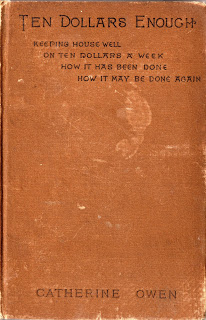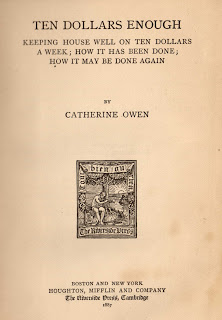JJ Jacobson has been Curator of American Culinary History at the Clements since 2009. She has many favorites from the Janice Bluestein Longone Culinary Archive, including cookbooks, domestic manuals, etiquette manuals, and menus. Her current favorite is Ten Dollars Enough by Catherine Owen, published in 1887. Catherine Owen was the pen name of Helen Alice Matthews Nitsch, who dispensed household advice through cookbooks, magazine articles, and serialized novels in the late 19th century. We don’t know much about Nitsch, but her biographer, Beverly Seaton, deduces from her writings that she was from a middle-class background, and may have been a student at one of the American Cooking Schools that flourished from the 1860s onward.
Owen’s fiction straddles a number of genres, including women’s fiction, cookbooks, etiquette manuals, and books of advice on housekeeping, childrearing, and the management of servants. Her stories are set in the domestic sphere for which women were supposed (by 19th-century domestic authorities such as Catharine Esther Beecher and Sarah Josepha Hale) to be uniquely responsible. Accordingly, the novels are dominated by narratives of women proving themselves capable by mastering some form of household work. In Ten Dollars Enough, the heroine, Molly Bishop, masters running her own household, including cooking, budgeting, and training a servant. In Owen’s later novels, Molly Bishop’s Family (1888) and Gentle Breadwinners: The Story of One of Them (1888), the heroines’ journeys include forays into acceptable business ventures, ones within the range of what a late-19th-century woman could do and remain respectable, such as running a boarding house or cooking professionally. Even in these, however, scenes of marketing, cooking, and serving and eating meals predominate.
The novel’s full title, Ten Dollars Enough: Keeping House Well on Ten Dollars a Week; How It Has Been Done; How It May Be Done Again, lets us know that little will be left to the imagination. It was originally published in serial form in Good Housekeeping in 1885 and 1886, and readers treated it as they would an advice column, writing in with questions and commendations for the author’s system. In the February 1886 issue, a reader wrote in: “I am also very much pleased with ‘Ten Dollars Enough.’ Having read in the last number that Catherine Owen would kindly aid us, I have availed myself of the opportunity to ask if she will write a list for a kitchen outfit, including all necessaries for culinary use.”
And, indeed, the bulk of the action comprises step-by-step depictions of cooking, planning for meals, budgeting, etc. Molly’s progression in skill and understanding, with its attendant uncertainties, mistakes, and triumphs, provides just enough tension in the narrative to keep the reader following the story. Can she prove herself as a housewife? Will Harry, her fastidious and rather spoiled husband (shunned by his family for marrying beneath him), accept her cooking? Can she keep him well fed on their budget? Will Marta, their “green girl” of a servant, respond to her training?
The social context in which all this domestic effort takes place–the couple’s relationship, their families, their new home and neighborhood–allows Owen to comment glancingly on many other subjects. For instance, Molly’s conversations with other women about Marta show us the state of “the servant problem” in late-19th-century America from various angles, along with attitudes about immigrants. Class comes into play from one side in Molly’s dealings with Marta, and from the other in her relationship with Harry’s snobbish family. (Ultimately, her housekeeping so impresses his parents that they are reconciled to the marriage, and consequently exert themselves to elevate the young couple’s status in various ways.) Women’s position in society, and the idea of “The New Woman,” are glanced at in the person of a neighbor, Mrs. Framley, who admonishes Molly for spoiling Harry, asserting “I am no woman’s rights woman; I don’t want to vote; but I do not believe in catering to a husband’s taste any more than he caters to mine.” This leads Molly to a meditation on gender roles, in which she articulates her reasons for “catering to” Harry. Other contemporary ideas Owen briefly notices include the housekeeper’s duty to charity within her community, and the relative advantages of urban and suburban living.
We have other titles in this genre, including Owen’s Gentle Breadwinners, and the anonymous Six Hundred Dollars a Year. A Wife’s Effort at Low Living, Under High Prices, as well as serialized stories in domestic magazines such as Good Housekeeping and American Cookery. Searches in the catalog on the subjects “Home economics — Fiction”, “Cooking — Fiction”, and “Housekeeping — Fiction” will bring them up. Such books open a window into American ideals about the act of cooking, the phenomenon of cuisine, and the place of food in public and private life.
Further Reading:
- Cohen, Kim. “‘True and Faithful in Everything’: Recipes for Servant and Class Reform in Catherine Owen’s Cookbook Novels.” Culinary Aesthetics and Practices in Nineteenth-Century American Literature. Ed. Monika Elbert, and Ed. Marie Drews, New York: Palgrave Macmillan, 2009. 107-121.
- Seaton, Beverly. “Nitsch, Helen (Alice) Matthews.” American Women Writers: A Critical Reference Guide from Colonial Times to the Present. Ed. Taryn Benbow-Pfalzgraf, Vol.3.. Detroit: St. James Press, 2000. 204-205.


